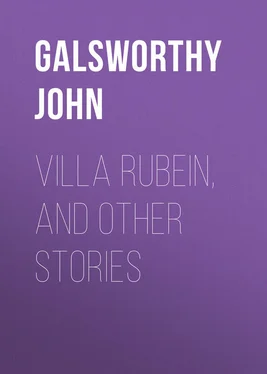John Galsworthy - Villa Rubein, and Other Stories
Здесь есть возможность читать онлайн «John Galsworthy - Villa Rubein, and Other Stories» — ознакомительный отрывок электронной книги совершенно бесплатно, а после прочтения отрывка купить полную версию. В некоторых случаях можно слушать аудио, скачать через торрент в формате fb2 и присутствует краткое содержание. Жанр: foreign_antique, foreign_prose, на английском языке. Описание произведения, (предисловие) а так же отзывы посетителей доступны на портале библиотеки ЛибКат.
- Название:Villa Rubein, and Other Stories
- Автор:
- Жанр:
- Год:неизвестен
- ISBN:нет данных
- Рейтинг книги:3 / 5. Голосов: 1
-
Избранное:Добавить в избранное
- Отзывы:
-
Ваша оценка:
- 60
- 1
- 2
- 3
- 4
- 5
Villa Rubein, and Other Stories: краткое содержание, описание и аннотация
Предлагаем к чтению аннотацию, описание, краткое содержание или предисловие (зависит от того, что написал сам автор книги «Villa Rubein, and Other Stories»). Если вы не нашли необходимую информацию о книге — напишите в комментариях, мы постараемся отыскать её.
Villa Rubein, and Other Stories — читать онлайн ознакомительный отрывок
Ниже представлен текст книги, разбитый по страницам. Система сохранения места последней прочитанной страницы, позволяет с удобством читать онлайн бесплатно книгу «Villa Rubein, and Other Stories», без необходимости каждый раз заново искать на чём Вы остановились. Поставьте закладку, и сможете в любой момент перейти на страницу, на которой закончили чтение.
Интервал:
Закладка:
“It will be very nice. You will stay and have some lunch? The arrangements here are rather odd. Such a mixed household – but there is always lunch at two o’clock for any one who likes, and we all dine at seven. You would have your sittings in the afternoons, perhaps? I should so like to see your sketches. You are using the old house on the wall for studio; that is so original of you!”
Harz would not stay to lunch, but asked if he might begin work that afternoon; he left a little suffocated by the sandalwood and sympathy of this sphinx-like woman.
Walking home along the river wall, with the singing of the larks and thrushes, the rush of waters, the humming of the chafers in his ears, he felt that he would make something fine of this subject. Before his eyes the faces of the two girls continually started up, framed by the sky, with young leaves guttering against their cheeks.
V
Three days had passed since Harz began his picture, when early in the morning, Greta came from Villa Rubein along the river dyke and sat down on a bench from which the old house on the wall was visible. She had not been there long before Harz came out.
“I did not knock,” said Greta, “because you would not have heard, and it is so early, so I have been waiting for you a quarter of an hour.”
Selecting a rosebud, from some flowers in her hand, she handed it to him. “That is my first rosebud this year,” she said; “it is for you because you are painting me. To-day I am thirteen, Herr Harz; there is not to be a sitting, because it is my birthday; but, instead, we are all going to Meran to see the play of Andreas Hofer. You are to come too, please; I am here to tell you, and the others shall be here directly.”
Harz bowed: “And who are the others?”
“Christian, and Dr. Edmund, Miss Naylor, and Cousin Teresa. Her husband is ill, so she is sad, but to-day she is going to forget that. It is not good to be always sad, is it, Herr Harz?”
He laughed: “You could not be.”
Greta answered gravely: “Oh yes, I could. I too am often sad. You are making fun. You are not to make fun to-day, because it is my birthday. Do you think growing up is nice, Herr Harz?”
“No, Fraulein Greta, it is better to have all the time before you.”
They walked on side by side.
“I think,” said Greta, “you are very much afraid of losing time. Chris says that time is nothing.”
“Time is everything,” responded Harz.
“She says that time is nothing, and thought is everything,” Greta murmured, rubbing a rose against her cheek, “but I think you cannot have a thought unless you have the time to think it in. There are the others! Look!”
A cluster of sunshades on the bridge glowed for a moment and was lost in shadow.
“Come,” said Harz, “let’s join them!”
At Meran, under Schloss Tirol, people were streaming across the meadows into the open theatre. Here were tall fellows in mountain dress, with leather breeches, bare knees, and hats with eagles’ feathers; here were fruit-sellers, burghers and their wives, mountebanks, actors, and every kind of visitor. The audience, packed into an enclosure of high boards, sweltered under the burning sun. Cousin Teresa, tall and thin, with hard, red cheeks, shaded her pleasant eyes with her hand.
The play began. It depicted the rising in the Tyrol of 1809: the village life, dances and yodelling; murmurings and exhortations, the warning beat of drums; then the gathering, with flintlocks, pitchforks, knives; the battle and victory; the homecoming, and festival. Then the second gathering, the roar of cannon; betrayal, capture, death. The impassive figure of the patriot Andreas Hofer always in front, black-bearded, leathern-girdled, under the blue sky, against a screen of mountains.
Harz and Christian sat behind the others. He seemed so intent on the play that she did not speak, but watched his face, rigid with a kind of cold excitement; he seemed to be transported by the life passing before them. Something of his feeling seized on her; when the play was over she too was trembling. In pushing their way out they became separated from the others.
“There’s a short cut to the station here,” said Christian; “let’s go this way.”
The path rose a little; a narrow stream crept alongside the meadow, and the hedge was spangled with wild roses. Christian kept glancing shyly at the painter. Since their meeting on the river wall her thoughts had never been at rest. This stranger, with his keen face, insistent eyes, and ceaseless energy, had roused a strange feeling in her; his words had put shape to something in her not yet expressed. She stood aside at a stile to make way for some peasant boys, dusty and rough-haired, who sang and whistled as they went by.
“I was like those boys once,” said Harz.
Christian turned to him quickly. “Ah! that was why you felt the play, so much.”
“It’s my country up there. I was born amongst the mountains. I looked after the cows, and slept in hay-cocks, and cut the trees in winter. They used to call me a ‘black sheep,’ a ‘loafer’ in my village.”
“Why?”
“Ah! why? I worked as hard as any of them. But I wanted to get away. Do you think I could have stayed there all my life?”
Christian’s eyes grew eager.
“If people don’t understand what it is you want to do, they always call you a loafer!” muttered Harz.
“But you did what you meant to do in spite of them,” Christian said.
For herself it was so hard to finish or decide. When in the old days she told Greta stories, the latter, whose instinct was always for the definite, would say: “And what came at the end, Chris? Do finish it this morning!” but Christian never could. Her thoughts were deep, vague, dreamy, invaded by both sides of every question. Whatever she did, her needlework, her verse-making, her painting, all had its charm; but it was not always what it was intended for at the beginning. Nicholas Treffry had once said of her: “When Chris starts out to make a hat, it may turn out an altar-cloth, but you may bet it won’t be a hat.” It was her instinct to look for what things meant; and this took more than all her time. She knew herself better than most girls of nineteen, but it was her reason that had informed her, not her feelings. In her sheltered life, her heart had never been ruffled except by rare fits of passion – “tantrums” old Nicholas Treffry dubbed them – at what seemed to her mean or unjust.
“If I were a man,” she said, “and going to be great, I should have wanted to begin at the very bottom as you did.”
“Yes,” said Harz quickly, “one should be able to feel everything.”
She did not notice how simply he assumed that he was going to be great. He went on, a smile twisting his mouth unpleasantly beneath its dark moustache – “Not many people think like you! It’s a crime not to have been born a gentleman.”
“That’s a sneer,” said Christian; “I didn’t think you would have sneered!”
“It is true. What is the use of pretending that it isn’t?”
“It may be true, but it is finer not to say it!”
“By Heavens!” said Harz, striking one hand into the other, “if more truth were spoken there would not be so many shams.”
Christian looked down at him from her seat on the stile.
“You are right all the same, Fraulein Christian,” he added suddenly; “that’s a very little business. Work is what matters, and trying to see the beauty in the world.”
Christian’s face changed. She understood, well enough, this craving after beauty. Slipping down from the stile, she drew a slow deep breath.
“Yes!” she said. Neither spoke for some time, then Harz said shyly:
“If you and Fraulein Greta would ever like to come and see my studio, I should be so happy. I would try and clean it up for you!”
Читать дальшеИнтервал:
Закладка:
Похожие книги на «Villa Rubein, and Other Stories»
Представляем Вашему вниманию похожие книги на «Villa Rubein, and Other Stories» списком для выбора. Мы отобрали схожую по названию и смыслу литературу в надежде предоставить читателям больше вариантов отыскать новые, интересные, ещё непрочитанные произведения.
Обсуждение, отзывы о книге «Villa Rubein, and Other Stories» и просто собственные мнения читателей. Оставьте ваши комментарии, напишите, что Вы думаете о произведении, его смысле или главных героях. Укажите что конкретно понравилось, а что нет, и почему Вы так считаете.












